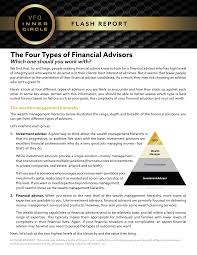
There are several key markets for financial advisors. Retirees as well as Millennials, high-net worth clients and people going through major life transitions are some of the key markets. Each grouping has a unique need and financial expertise. Knowing the demographics of each group will help identify the best opportunities to reach them.
Millennials
Financial advisors now have a new market: the millennial generation. The millennial generation is growing in popularity and has become an influential segment of society. However, older generations often judge millennials about how they manage money. Financial advisors are uniquely qualified to assist millennials in making financial decisions.
Financial advisors need to offer a digital experience that meets their customers' needs in order to attract this market. This starts with a website that serves as a hub for communication. This website should allow for clients to book appointments and pay invoices online. It is vital that digital information is exchanged. A mobile app can elevate the client experience even further. This technology allows for real-time and on-demand access to data.
Retirees
Retirees are an ideal target market for financial advisors when you're planning for retirement. Their needs and goals are unique and they may need help navigating their finances. A financial advisor can help with their investment planning for education as well as help them to choose the right life insurance policy.

Many retirees desire to downsize their homes and generate income for retirement. They also want to leave a lasting legacy for their family. They may also be more interested in protecting their assets and avoiding financial risks as they age. This market should be targeted by products and services that address assets protection, estate planning and retirement planning.
Clients with high-net-worth
It takes a different approach from marketing to other client groups in order to attract high-net worth clients. High-net worth clients have high levels in income and assets and are often retired. They often invest in events and require assistance with their wealth planning and estate management. They may also be involved in charitable causes. It is therefore important to understand the market needs before you plan your marketing strategy.
It is possible to target high-networth clients and grow your business. Financial advisors who focus on this segment of the market will be more visible than competitors and have higher chances of growing and profiting.
Retirees going through major life changes
As they get closer to retirement, retired people may be considering downsizing their homes, creating a retirement income, or leaving a lasting legacy. They may start to shift away riskier investments in favor safer options. In this case, financial advisors should offer products and services that address income planning, estate planning, and asset protection.
Young adults are also a target market for financial advisors. These individuals are able to benefit from advice regarding budgeting, student loans counseling, and retirement planning advice. These individuals may also be newlyweds or couples with young children. Additionally, young couples might not have spent much money prior to having children. This means that they may need to spend more money on their children's education.

Retirees in a divorce
No matter what niche you choose, there are opportunities to grow in your area of expertise. A minority family with children is one of the most lucrative markets for financial advisors. These families often have a high net-worth and substantial investment resources. These people can afford to have a financial adviser. Additionally, many of them have children and are looking for a way to provide for their children. Advisors would be well-suited for these clients.
Divorce can impact retirement savings. These savings, while large, can be used quickly. There are many rules that govern how these retirement plans should be divided. A sole holder of a 401(k) or individual retirement account can receive a smaller portion than their spouse. It may be necessary for the spouse with more money to transfer the money to their account.
FAQ
How to Choose an Investment Advisor
It is very similar to choosing a financial advisor. Consider experience and fees.
The advisor's experience is the amount of time they have been in the industry.
Fees are the price of the service. You should compare these costs against the potential returns.
It's important to find an advisor who understands your situation and offers a package that suits you.
What is wealth management?
Wealth Management can be described as the management of money for individuals or families. It covers all aspects of financial planning including investment, insurance, tax and estate planning, retirement planning, protection, liquidity and risk management.
What is investment risk management?
Risk Management is the practice of managing risks by evaluating potential losses and taking appropriate actions to mitigate those losses. It involves identifying and monitoring, monitoring, controlling, and reporting on risks.
Investment strategies must include risk management. Risk management has two goals: to minimize the risk of losing investments and maximize the return.
The key elements of risk management are;
-
Identifying risk sources
-
Monitoring and measuring risk
-
How to control the risk
-
Manage the risk
What is estate planning?
Estate planning is the process of creating an estate plan that includes documents like wills, trusts and powers of attorney. These documents serve to ensure that you retain control of your assets after you pass away.
Do I need a retirement plan?
No. You don't need to pay for any of this. We offer free consultations so we can show your what's possible. Then you can decide if our services are for you.
How to manage your wealth.
First, you must take control over your money. You need to understand how much you have, what it costs, and where it goes.
You should also know how much you're saving for retirement and what your emergency fund is.
If you do not follow this advice, you might end up spending all your savings for unplanned expenses such unexpected medical bills and car repair costs.
Statistics
- As of 2020, it is estimated that the wealth management industry had an AUM of upwards of $112 trillion globally. (investopedia.com)
- These rates generally reside somewhere around 1% of AUM annually, though rates usually drop as you invest more with the firm. (yahoo.com)
- If you are working with a private firm owned by an advisor, any advisory fees (generally around 1%) would go to the advisor. (nerdwallet.com)
- A recent survey of financial advisors finds the median advisory fee (up to $1 million AUM) is just around 1%.1 (investopedia.com)
External Links
How To
How do you become a Wealth Advisor
A wealth advisor is a great way to start your own business in the area of financial services and investing. This profession has many opportunities today and requires many skills and knowledge. These are the qualities that will help you get a job. A wealth advisor is responsible for giving advice to people who invest their money and make investment decisions based on this advice.
You must choose the right course to start your career as a wealth advisor. The course should cover topics such as personal finance and tax law. It also need to include legal aspects of investing management. You can then apply for a license in order to become a wealth adviser after you have completed the course.
These are some ways to be a wealth advisor.
-
First, let's talk about what a wealth advisor is.
-
You should learn all the laws concerning the securities market.
-
You should study the basics of accounting and taxes.
-
After completing your education you must pass exams and practice tests.
-
Finally, you need to register at the official website of the state where you live.
-
Apply for a license for work.
-
Show your business card to clients.
-
Start working!
Wealth advisors typically earn between $40k and $60k per year.
The size and location of the company will affect the salary. Therefore, you need to choose the best firm based upon your experience and qualifications to increase your earning potential.
To sum up, we can say that wealth advisors play an important role in our economy. It is important that everyone knows their rights. It is also important to know how they can protect themselves from fraud or other illegal activities.